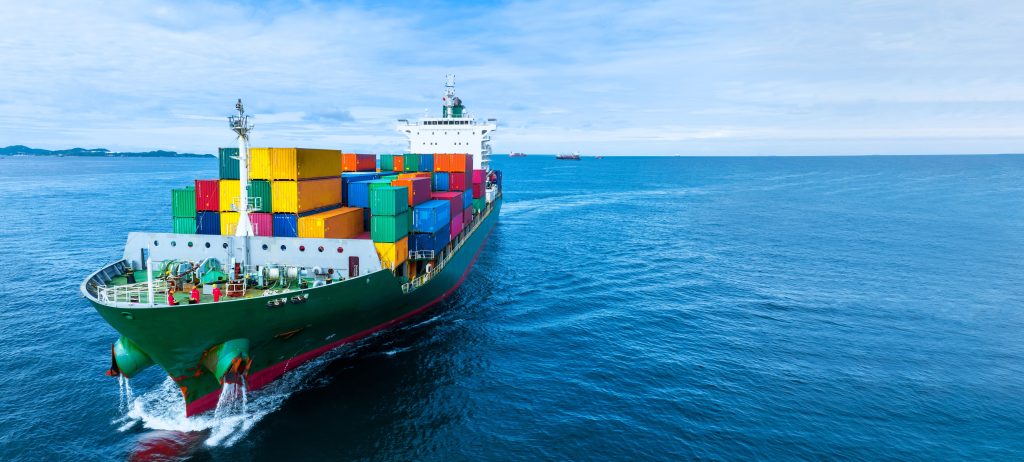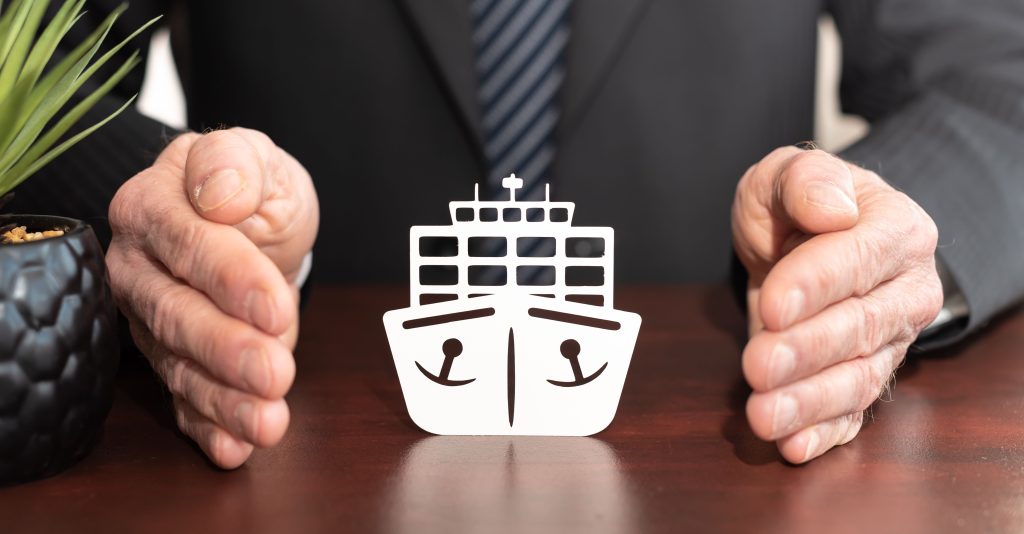Ever placed an order for your favourite basketball club’s merchandise? Those Jordan’s (Yup, the cool pair of kicks that have the silhouette of the legendary Michael Jordan embossed) may give you the diehard fan in you a cause for celebration. But have you ever thought about what goes on behind the scenes when you order one?
Your order starts a complex chain of events involving a complex network of manufacturers, logistics companies, and insurance providers. You might be wondering what insurance has to do with e-commerce. This is where marine insurance as we know it comes into the picture. Marine Insurance insures items worth billions of dollars from when they leave production to when they arrive at the buyer’s warehouse.
International piracy is rising, as are road accidents, collisions between commercial tankers caused by human error, and even stock damage during cargo loading and unloading.
A slight hiccup in the procedure might cause delays, accidents, or even damage to the goods. Such risks can spread across the system, causing financial hardship for otherwise unrelated enterprises. A marine insurance policy might save you the trouble of not knowing what the future holds and how it will affect your shipment.
What is Meant by Marine Insurance?
Marine insurance companies provide their clients with more confidence to establish and achieve new growth targets by protecting them from various dangers at sea.
So, without further ado, let’s take s deep dive into what marine insurance is, the types of marine insurance and everything you need to know before setting sail.

Importance of Marine Insurance
Some important factors of Marine Insurance are given below:
Guaranteed Interest: The policyholder must have some insurable interest in the matter for which insurance is being purchased, according to the principal. This implies that the policyholder should benefit from the safe delivery of goods and should sustain losses as a result of damage to those products. When acquiring a maritime insurance policy, it is possible that the policyholder does not have an insurable interest, but he should anticipate developing one in the future. To be eligible to receive a claim from the insurer, the policyholder must have some insurable interest in the insured item.
Good Faith: The marine insurance policy is based on the idea of absolute good faith, which makes it obvious that the holder must provide accurate information while filling out the marine insurance policy document. The applicant will also not conceal any crucial information. The marine insurance company has the right to reject the application for the policy if the applicant withholds or suppresses material information.
Reduced Losses: Just though someone is covered by marine insurance coverage, it does not give them a license to behave recklessly. It is crucial for the policyholder to take all necessary actions to prevent and reduce losses. Simply because the property is protected by marine insurance does not excuse the owner from acting appropriately during an accident. Marine insurance is a feature that aids in reducing the risks of financial disaster to the property, such as goods, ships, or other movables, in the oceanic vehicle, in exchange for the insured paying the insurance provider’s premium. Purchase marine cargo insurance to safeguard yourself against such occurrences.
Nearest Cause Accountability: The proximate or nearest cause is considered by the marine insurance policyholder at the time of the loss. This helps determine the real cause of the loss when several factors have contributed to it. In this case, a remote reason for a loss is not required to determine the liability. Thus the marine insurance provider must settle the claim if the proximate cause is insured.
Features and benefits of marine insurance
Since India is bordered by water on three sides, shipping is a significant industry. Because these ports handle a large volume of cargo, marine insurance is something that you should not skip. And to prepare you for anything before you head out on the mighty waters, here are some benefits and features we thought you should know about!
| Features and benefits of marine insurance |
| Comprehensive coverage – When you buy a marine insurance policy, you get comprehensive coverage against all the potential marine-related perils that your goods get exposed to during transit. |
| Easy Customisation – The marine insurance plans are generally effortlessly customisable and can be adjusted per your specific needs and conditions. |
| Flexibility – The marine insurance plans usually provide enough flexibility and have an array of options to cater to your requirements as an insured, considering your budget. |
| Claim survey and settlement assistance – Marine insurance policies free you from the hassles of the claim. Usually, marine insurance policies offer global claim settlement support alongside a claim survey. |
| Extension of coverage – Under a marine insurance policy, you get the liberty to amplify the coverage with several add-on benefits or riders to provide adequate coverage from risks arising due to strikes, riots, etc. |
How Marine Insurance works?
All obligation is transferred from you and other stakeholders to the insurance provider when you obtain marine insurance coverage. That being stated, you have a limited amount of responsibility as the intermediary handling the transported items. However, as an exporter, acquiring insurance coverage enables you to safeguard the shipment from any loss or harm. The exporter is typically required to carry marine insurance under the export agreement. Therefore, in order to comply with the terms and conditions of an agreement, such as Carriage and Insurance Paid (CIP) or Cost Insurance and Freight, if you are an exporter, you must get marine insurance (CIF). These will assist you in upholding the contractual policies and safeguarding the interests and property of your clients.
Reasons to buy Marine Insurance
Below are a few ways that marine insurance can give you security.
- Your boat: It goes without saying that one of the most crucial justifications for buying commercial marine insurance coverage is to safeguard your own assets. While out on the ocean, various issues can arise with your vessel, costing thousands or even millions of dollars. Your boat could be damaged or destroyed by a storm, a fire, a collision, or any number of other potential events. You want to ensure you have coverage in place to safeguard you from the worst-case scenario because losing your watercraft might cripple your operation.
- Towing: It’s crucial to get coverage in case your large vessel becomes stranded if you operate one as part of your line of work. It may cost tens of thousands of dollars to bring your ship back to port if it breaks down at sea.
- Liability protection: All firms that operate on the water must have liability protection. Liability insurance can shield your company from any harm you or your staff may cause, including harm to docks or other marine structures. Although there are legal liability minimums, it is frequently a good idea to get extra protection. Without it, you can be held responsible for significant losses in the event of negligence.
- Pollution: Pollution can be a major danger when working on the sea, yet many common commercial marine plans limit or exclude coverage for this. Particularly if you are hauling chemicals or other items that could harm the environment, you should make sure to restrict your exposure as fines can be quite high.
- Cargo: If your company transports cargo on a marine vessel, you must ensure that the cargo is covered in case of theft or catastrophe. In some circumstances, the cargo’s value can exceed your assets. While local and international rules vary, you or your client must ensure that your goods is safeguarded.

Why should you buy Marine Insurance?
To maintain the security of your priceless possessions, you must get marine insurance. The carriers used to deliver the merchandise are only partially liable. You can insure the things up to a set amount above the insurer’s invoice value, depending on your preferred insurance provider.
How to calculate Marine Insurance Premium?
The following are some important factors that are taken into account while determining the marine insurance premium:
Type and construction of the vessel: A shipping vessel’s construction, type, quality, and fitness are key factors in deciding the marine insurance premium for the cargo that will be delivered there. Before delivering a marine insurance quote, the insurance company typically requests information about the vessel. It is possible to inquire about the vessel’s ownership, structural integrity, building materials, and ability to accommodate various types of cargo.
Disasters: Natural disasters or forces of nature, such as earthquakes, tsunamis, floods, cyclones, etc., can happen anytime and seriously harm the commodities transported. Although these dangers can never be forecast, historical trends indicate that they have a high likelihood of happening at certain times of the year and in certain locations. In reality, certain ports are more vulnerable to these catastrophes because of things like inadequate depth and a lack of tide protection. The cost of marine insurance can be significantly impacted by these factors.
Good’s value: It goes without saying that the goods’ value and nature. The evaluation of the premium amount heavily depends on the value and nature of the products for which marine insurance is required. The cost of maritime insurance is likely to increase if the value of the products is large or if there is a significant likelihood that the goods will be destroyed, such as glass, food items, etc.
Nationality of the vessel: When determining the marine insurance premium, insurers also take the nationality of the vessel into account. It’s because a ship’s nationality reflects the qualifications of its crew and masters.
Key Takeaways
- Ships, cargo, terminals, and any transport by which property is transferred, acquired, or held between the places of origin and the final destination are all covered by marine insurance.
- Cargo insurance is a subset of marine insurance, which also covers onshore and offshore exposed property (container terminals, ports, oil platforms, and pipelines), as well as hull, marine casualty, and marine liability.
- The core concepts of Marine Insurance are Indemnity, Insurable Interest, Utmost Good Faith, Proximate Cause, Subrogation, and Contribution.
Types of Marine Insurance
Understanding the different types of marine insurance can be a risk management lesson for business owners who regularly deal with freight, transit, and maritime transportation businesses.
The different types of marine insurance are determined by how the insurance cover is conceptualized, the risk characteristics, and the underlying assets. So, to help you make the best decision, here we are with some common types of marine insurance. However, remember that the types of marine insurance can vary according to the insurer, if you come back and say that we’ve missed out on something.
| Types of marine insurance policies |
| Marine cargo insurance – Marine cargo insurance is a policy designed to cover loss/damages to marine cargo during transit. It also covers third-party liabilities. It is primarily advantageous for tankers and other heavy cargo shipments. |
| Liability insurance- This type of marine insurance protects in the event of a crash, collision or anything that causes a huge loss or damage. Liability marine insurance compensates the policyholder for liabilities beyond control. |
| Hull insurance – This marine insurance policy covers vessels, including furniture and other stuff, against unpredictable mishaps. |
| Freight insurance – It is a type of marine insurance that compensates the shipping company in case any freight is damaged/lost. |
| Open marine insurance policy – This type of marine insurance is issued for a specific time and provides coverage for all shipments during that period. |
| Time plan – This type of marine insurance is generally valid for a year or a predetermined specific period. |
| Voyage plan – Under this type of marine insurance, the plan expires as soon as a particular insured voyage ends. |
| Mixed plan – If marine insurance provides both time plan and voyage plan benefits, it is referred to as a mixed plan. |
| Port risk plan – When a ship is stationed at a port, this type of marine insurance protects it against the risks. |
| Valued plan – Within this type of marine insurance, the cargo’s or consignment’s value is determined, and it helps if it gets lost. |
| Floating plan – Under this type of marine insurance, the claim amount is specified beforehand. Under this, the other details cannot be disclosed before the ship starts the voyage. It is best suited for people who undertake cargo transportation trips regularly. |
| Wager plan – Under this type of marine insurance, there are no predefined fixed repayment terms. Nevertheless, if the coverage amount falls short in deserving cases, reimbursement is given. |

Did You Know?
Marine insurance, which has its roots in Greek and Roman maritime loans, was the first well-developed type of insurance. In the fourteenth century, separate marine insurance contracts were formed in Genoa and other Italian ports, expanding throughout northern Europe. Premiums varied according to intuitive estimations of seasonal and pirate risk.
With the formation of a specialist chamber of assurance apart from the other Courts in England in 1601, the contemporary origins of maritime insurance law in English law were in the law merchant.
Inclusions and Exclusions of Marine Insurance to Know Before Riding the Wave
For each customer, the cargo movement is not the same. Insurance is also required in different ways by different clients and at different times. There is no one-size-fits-all when talking about marine insurance; here are some inclusions and exclusions you should be aware of.
| Inclusions | Exclusions |
| Sinking, stranding, fire, explosion | Willful, planned or intentional misconduct |
| Loss in loading and unloading cargo | Strike, rioting, war |
| Total loss coverage | Poor packaging of the cargo |
| Earthquake and lightning | Delays |
| Unforeseeable administrative expenses | General leakage and wear and tear of the cargo |
| Jettison and washing overboard | Financial distress or insolvency of the shipping line |
| Collision, overturning, derailment, accident | Removal of wreck |
| General average |
Types of plans under Marine Insurance policy
There are essentially four kinds of Marine Insurances:
Freight Insurance: With freight insurance, for instance, the operator would lose freight receivables if the items were damaged in transit. Therefore the insurance will be based on reimbursement for loss of freight.
Hull Insurance: Insurance for the hull and torso of the transportation vehicle is provided by the hull insurance. It protects the conveyance against damage and mishaps.
Liability Insurance: Marine Liability Insurance is when compensation is purchased to cover any liability resulting from a ship colliding or crashing.
Cargo Insurance: The insurance of commodities sent from the country of origin to the country of destination is referred to as a marine cargo policy.
Open Policy
Your company’s inland consignment movement is covered by Open Marine Policy. This Policy is best suited for companies who conduct a significant amount of transit-based transactions. All cargo shipments must be insured because every shipment on the high seas carries an equal risk; this can be a hassle for businesses doing big amounts of business. Multiple shipments can be covered by an open policy in marine insurance until the policy is cancelled or the amount insured is used up, whichever occurs first. This enables businesses to conduct deals confidently, knowing that their cargo shipments are continuously and automatically insured.
Because the insurer does not need to purchase separate policies for each consignment and each transit, open marine insurance is also known as floating plans. This policy guards against damages brought on by disasters such as flooding, fire, explosion, and so forth. Businesses engaged in the business of moving products, such as merchants, import-export companies, banks, shipping agencies, etc., are most suited to purchase this coverage.
Specific Policy
A marine specific insurance policy is a type of transit insurance that guards against potential monetary loss for items that are transported from one location to another by road, rail, air, sea, courier, etc. Transporting goods could involve
- Within India’s borders
- Import from any location in the world to any location in India
- Anywhere in India can export goods to any country in the world.
Which is covered in Marine Insurance?
The loss or damage of ships, cargo, terminals, and any other means of transportation used to move the property between its points of origin and its destination is covered by marine insurance. Cargo insurance is a subset of maritime insurance, covering Hull, Marine Casualty, and Marine Liability as well as Onshore and Offshore Exposed Property (container terminals, ports, oil platforms, and pipelines). Shipping insurance is utilized in place of this delivery method when sending or receiving packages.
What is not covered in Marine Insurance?
The following are the primary exclusions from marine insurance:
- Losses or damages brought on through negligence or misbehaviour
- Damage or loss brought on by inadequate packaging
- Wire loss or damage, a strike, a riot, or other civil unrest
- Wreck removal or accident scene cleanup
Who should buy Marine Insurance?
Marine insurance is always a good option as it protects your expensive possessions and gives you peace of mind when out on the water. But, if we talk on specific terms, who exactly is marine insurance meant for? We are here to help you navigate through these deep waters of marine insurance.
A marine insurance policy can be purchased by buyers and sellers, import/export merchants, contractors, banks or anyone engaged in the import and export or transportation of goods within the country. Different types of marine insurance policies like hull insurance can also benefit ship owners. Also, a business engaged in transferring goods can use cargo insurance. Generally, the contract of sale would decide who can purchase a marine policy.
Claim process Marine Insurance policy
Following your purchase of marine insurance, you can take the following actions if you need to file a claim under the terms of the policy:
- You must notify the insurance provider immediately if there is a loss of, damage to, or defect with the ship or its cargo.
- A surveyor will evaluate the mentioned loss or damage.
- Along with the properly completed claim form, all supporting documentation and eyewitnesses must be provided.
- The insured must submit a financial claim for a missing package to the insurance company and receive an acknowledgement.
- The supplier will either approve the claim if it thinks the circumstances are appropriate or deny it.
- You can go to court if you’re not happy with the outcome of the case.
Word to Remember
Contract of sales
The contract of sale acts as a deciding factor in who can purchase a marine insurance policy. Some of the most common contracts include:
- FOB (Free on Board)
- C&F (Cost & Freight)
- CIF (Cost, Insurance & Freight)
In the case of FOB and C&F contracts, the buyer is responsible for insurance, whereas the seller is responsible in the case of CIF contracts.
Conclusion
Marine insurance provides a safe haven for shipping companies and transporters by reducing the risk of financial loss due to the loss of valuable cargo. It also aids in instilling in shipping firms and receiving parties the insurance companies’ responsibility, dedication, and transparency.
But before we leave you at the shore and get ready for another journey, we’d like to share some general advice on how you can go about choosing marine insurance.
In India, it becomes a difficult task to select amongst the plethora of available marine insurance options. Therefore, the best way to buy marine insurance is to compare policies online and select a customized plan according to your specific needs. The correct approach is to compare, analyze coverage and use the internet to find the best marine insurance.
Now that you know the basics get ready for a happy journey at sea!
FAQs
The value of the package or the freight cost is determined first. For the cost of escalation, then add 10%. of the total amount acquired after multiplying it by the insurance premium that the insurance company has offered. The amount to be paid as a premium is determined by the final value acquired.
The ship’s owner
The cargo’s owner
The ship’s master and crew
The creator who has advanced money on the security of the ship
The mortgagor, if the insurable subject is mortgaged
A trustee with property in trust
The person advancing the freight
The claims process for marine insurance is simple. Below are the steps you’ll need to follow:
Inform the insurer by approaching the claim representative or visiting their nearest branch immediately
In the event of damages caused to goods that are on the ship, a port or joint ship must be arranged by you
Submission of policy documents and other relevant documents required for claim testimony
Though it is advisable to do your research before selecting a company when purchasing marine insurance, here are some popular options you can look at:
Bharti AXA
New India Assurance Co. Ltd.
Tata AIG
HDFC Ergo
Royal Sundaram
United India Assurance Co. Ltd
Cholamandalam Insurance Company
Duly filled in the claim form
Original insurance certificate with the policy number
Copy of Billing Lading
Survey report or missing certificate
Original invoice, packing list, shipping specification
Copies of correspondence exchanged
They include producers, purchasing representatives, purchasers, import/export traders, vendors, banks, contractors, or anybody involved in the transportation of products.
Any type of export is covered from any location in India to any country worldwide. Most transit modes covered by this type of policy are air and sea.
The loss or damage of ships, cargo, terminals, and any other means of transportation used to move the property between its points of origin and its destination is covered by marine insurance.
In addition to providing complete coverage, marine insurance safeguards your shipment from various risks, including collisions, derailments of land conveyances, theft and piracy, fire and explosion, and natural catastrophes, including storms, hurricanes, earthquakes, and cyclones.




